目的
1.准确理解MapReduce二次排序的设计原理
2.了解二次排序的适用场景
3.熟练掌握MapReduce二次排序程序代码编写
实验原理
在Map阶段,使用job.setInputFormatClass定义的InputFormat将输入的数据集分割成小数据块splites,同时InputFormat提供一个RecordReder的实现。本实验中使用的是TextInputFormat,他提供的RecordReder会将文本的字节偏移量作为key,这一行的文本作为value。这就是自定义Map的输入是<LongWritable, Text>的原因。然后调用自定义Map的map方法,将一个个<LongWritable, Text>键值对输入给Map的map方法。注意输出应该符合自定义Map中定义的输出<IntPair, IntWritable>。最终是生成一个List<IntPair, IntWritable>。在map阶段的最后,会先调用job.setPartitionerClass对这个List进行分区,每个分区映射到一个reducer。每个分区内又调用job.setSortComparatorClass设置的key比较函数类排序。可以看到,这本身就是一个二次排序。 如果没有通过job.setSortComparatorClass设置key比较函数类,则可以使用key实现的compareTo方法进行排序。 在本实验中,就使用了IntPair实现的compareTo方法。
在Reduce阶段,reducer接收到所有映射到这个reducer的map输出后,也是会调用job.setSortComparatorClass设置的key比较函数类对所有数据对排序。然后开始构造一个key对应的value迭代器。这时就要用到分组,使用job.setGroupingComparatorClass设置的分组函数类。只要这个比较器比较的两个key相同,他们就属于同一个组,它们的value放在一个value迭代器,而这个迭代器的key使用属于同一个组的所有key的第一个key。最后就是进入Reducer的reduce方法,reduce方法的输入是所有的(key和它的value迭代器)。同样注意输入与输出的类型必须与自定义的Reducer中声明的一致。
实验环境
Linux Ubuntu 16.04
jdk-7u75-linux-x64
hadoop-2.6.0-cdh5.4.5
hadoop-2.6.0-eclipse-cdh5.4.5.jar
eclipse-java-juno-SR2-linux-gtk-x86_64
实验内容
在电商网站中,用户进入页面浏览商品时会产生访问日志,记录用户对商品的访问情况,现有goods_visit2表,包含(goods_id,click_num)两个字段,数据内容如下:
- goods_id click_num
- 1010037 100
- 1010102 100
- 1010152 97
- 1010178 96
- 1010280 104
- 1010320 103
- 1010510 104
- 1010603 96
- 1010637 97
编写MapReduce代码,功能为根据商品的点击次数(click_num)进行降序排序,再根据goods_id升序排序,并输出所有商品。
输出结果如下:
- 点击次数 商品id
- ------------------------------------------------
- 104 1010280
- 104 1010510
- ------------------------------------------------
- 103 1010320
- ------------------------------------------------
- 100 1010037
- 100 1010102
- ------------------------------------------------
- 97 1010152
- 97 1010637
- ------------------------------------------------
- 96 1010178
- 96 1010603
实验步骤
1.切换到/apps/hadoop/sbin目录下,开启Hadoop。
- cd /apps/hadoop/sbin
- ./start-all.sh
2.在Linux本地新建/data/mapreduce8目录。
- mkdir -p /data/mapreduce8
3.在Linux中切换到/data/mapreduce8目录下,用wget命令从http://172.16.103.12:60000/allfiles/mapreduce8/goods_visit2网址上下载文本文件goods_visit2。
- cd /data/mapreduce8
- wget http://172.16.103.12:60000/allfiles/mapreduce8/goods_visit2
然后在当前目录下用wget命令从http://172.16.103.12:60000/allfiles/mapreduce8/hadoop2lib.tar.gz网址上下载项目用到的依赖包。
- wget http://172.16.103.12:60000/allfiles/mapreduce8/hadoop2lib.tar.gz
将hadoop2lib.tar.gz解压到当前目录下。
- tar zxvf hadoop2lib.tar.gz
4.首先在HDFS上新建/mymapreduce8/in目录,然后将Linux本地/data/mapreduce8目录下的goods_visit2文件导入到HDFS的/mymapreduce8/in目录中。
- hadoop fs -mkdir -p /mymapreduce8/in
- hadoop fs -put /data/mapreduce8/goods_visit2 /mymapreduce8/in
5.新建Java Project项目,项目名为mapreduce8


在mapreduce8项目下新建一个package包,包名为mapreduce。


在mapreduce的package包下新建一个SecondarySort类。

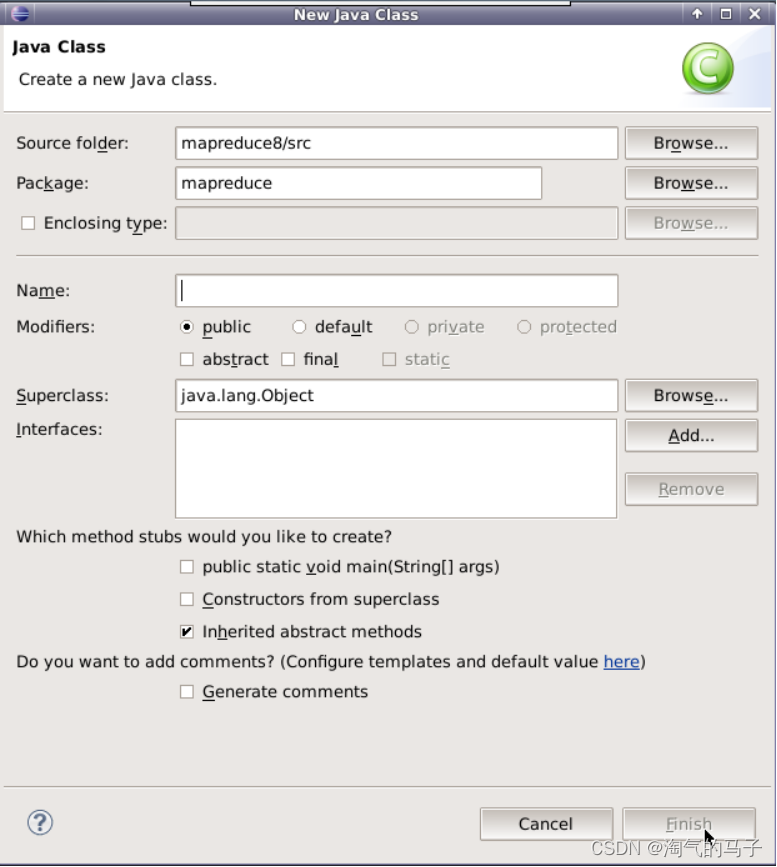
6.添加项目所需依赖的jar包,右键单击mapreduce8,新建一个文件夹hadoop2lib,用于存放项目所需的jar包
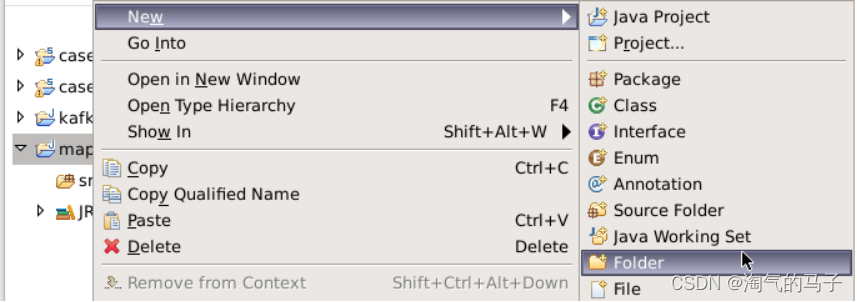
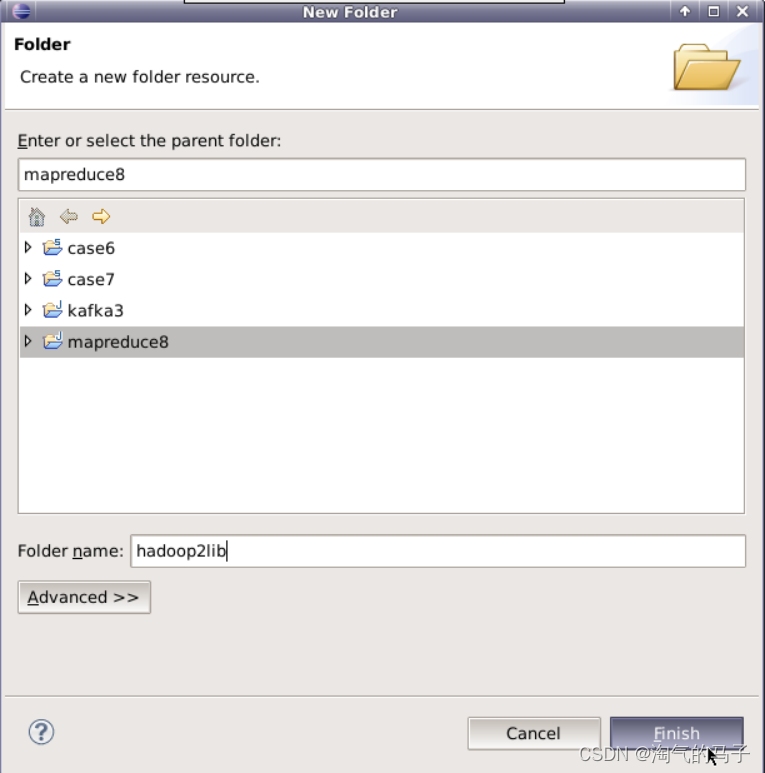
将/data/mapreduce8目录下,hadoop2lib目录中的jar包,拷贝到eclipse中mapreduce8项目的hadopo2lib目录下。
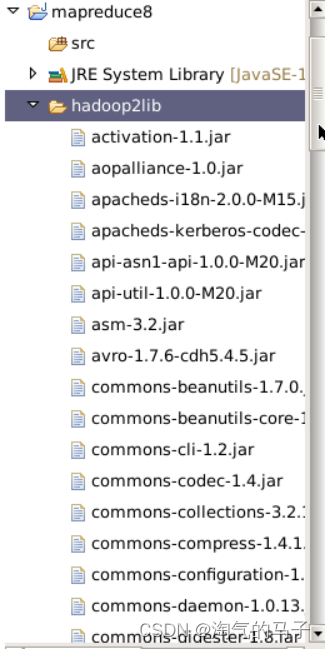
选中hadoop2lib目录下所有jar包,并添加到Build Path中。

7.编写Java代码,并描述其设计思路
二次排序:在mapreduce中,所有的key是需要被比较和排序的,并且是二次,先根据partitioner,再根据大小。而本例中也是要比较两次。先按照第一字段排序,然后在第一字段相同时按照第二字段排序。根据这一点,我们可以构造一个复合类IntPair,他有两个字段,先利用分区对第一字段排序,再利用分区内的比较对第二字段排序。Java代码主要分为四部分:自定义key,自定义分区函数类,map部分,reduce部分。
自定义key的代码:
- public static class IntPair implements WritableComparable<IntPair>
- {
- int first; //第一个成员变量
- int second; //第二个成员变量
- public void set(int left, int right)
- {
- first = left;
- second = right;
- }
- public int getFirst()
- {
- return first;
- }
- public int getSecond()
- {
- return second;
- }
- @Override
- //反序列化,从流中的二进制转换成IntPair
- public void readFields(DataInput in) throws IOException
- {
- // TODO Auto-generated method stub
- first = in.readInt();
- second = in.readInt();
- }
- @Override
- //序列化,将IntPair转化成使用流传送的二进制
- public void write(DataOutput out) throws IOException
- {
- // TODO Auto-generated method stub
- out.writeInt(first);
- out.writeInt(second);
- }
- @Override
- //key的比较
- public int compareTo(IntPair o)
- {
- // TODO Auto-generated method stub
- if (first != o.first)
- {
- return first < o.first ? 1 : -1;
- }
- else if (second != o.second)
- {
- return second < o.second ? -1 : 1;
- }
- else
- {
- return 0;
- }
- }
- @Override
- public int hashCode()
- {
- return first * 157 + second;
- }
- @Override
- public boolean equals(Object right)
- {
- if (right == null)
- return false;
- if (this == right)
- return true;
- if (right instanceof IntPair)
- {
- IntPair r = (IntPair) right;
- return r.first == first && r.second == second;
- }
- else
- {
- return false;
- }
- }
- }
所有自定义的key应该实现接口WritableComparable,因为是可序列的并且可比较的,并重载方法。该类中包含以下几种方法:1.反序列化,从流中的二进制转换成IntPair 方法为public void readFields(DataInput in) throws IOException 2.序列化,将IntPair转化成使用流传送的二进制 方法为public void write(DataOutput out)3. key的比较 public int compareTo(IntPair o) 另外新定义的类应该重写的两个方法 public int hashCode() 和public boolean equals(Object right) 。
分区函数类代码
- public static class FirstPartitioner extends Partitioner<IntPair, IntWritable>
- {
- @Override
- public int getPartition(IntPair key, IntWritable value,int numPartitions)
- {
- return Math.abs(key.getFirst() * 127) % numPartitions;
- }
- }
对key进行分区,根据自定义key中first乘以127取绝对值在对numPartions取余来进行分区。这主要是为实现第一次排序。
分组函数类代码
- public static class GroupingComparator extends WritableComparator
- {
- protected GroupingComparator()
- {
- super(IntPair.class, true);
- }
- @Override
- //Compare two WritableComparables.
- public int compare(WritableComparable w1, WritableComparable w2)
- {
- IntPair ip1 = (IntPair) w1;
- IntPair ip2 = (IntPair) w2;
- int l = ip1.getFirst();
- int r = ip2.getFirst();
- return l == r ? 0 : (l < r ? -1 : 1);
- }
- }
分组函数类。在reduce阶段,构造一个key对应的value迭代器的时候,只要first相同就属于同一个组,放在一个value迭代器。这是一个比较器,需要继承WritableComparator。
map代码:
- public static class Map extends Mapper<LongWritable, Text, IntPair, IntWritable>
- {
- //自定义map
- private final IntPair intkey = new IntPair();
- private final IntWritable intvalue = new IntWritable();
- public void map(LongWritable key, Text value, Context context) throws IOException, InterruptedException
- {
- String line = value.toString();
- StringTokenizer tokenizer = new StringTokenizer(line);
- int left = 0;
- int right = 0;
- if (tokenizer.hasMoreTokens())
- {
- left = Integer.parseInt(tokenizer.nextToken());
- if (tokenizer.hasMoreTokens())
- right = Integer.parseInt(tokenizer.nextToken());
- intkey.set(right, left);
- intvalue.set(left);
- context.write(intkey, intvalue);
- }
- }
- }
在map阶段,使用job.setInputFormatClass定义的InputFormat将输入的数据集分割成小数据块splites,同时InputFormat提供一个RecordReder的实现。本例子中使用的是TextInputFormat,他提供的RecordReder会将文本的一行的行号作为key,这一行的文本作为value。这就是自定义Map的输入是<LongWritable, Text>的原因。然后调用自定义Map的map方法,将一个个<LongWritable, Text>键值对输入给Map的map方法。注意输出应该符合自定义Map中定义的输出<IntPair, IntWritable>。最终是生成一个List<IntPair, IntWritable>。在map阶段的最后,会先调用job.setPartitionerClass对这个List进行分区,每个分区映射到一个reducer。每个分区内又调用job.setSortComparatorClass设置的key比较函数类排序。可以看到,这本身就是一个二次排序。如果没有通过job.setSortComparatorClass设置key比较函数类,则使用key实现compareTo方法。在本例子中,使用了IntPair实现compareTo方法。
Reduce代码:
- public static class Reduce extends Reducer<IntPair, IntWritable, Text, IntWritable>
- {
- private final Text left = new Text();
- private static final Text SEPARATOR = new Text("------------------------------------------------");
- public void reduce(IntPair key, Iterable<IntWritable> values,Context context) throws IOException, InterruptedException
- {
- context.write(SEPARATOR, null);
- left.set(Integer.toString(key.getFirst()));
- System.out.println(left);
- for (IntWritable val : values)
- {
- context.write(left, val);
- //System.out.println(val);
- }
- }
- }
在reduce阶段,reducer接收到所有映射到这个reducer的map输出后,也是会调用job.setSortComparatorClass设置的key比较函数类对所有数据对排序。然后开始构造一个key对应的value迭代器。这时就要用到分组,使用job.setGroupingComparatorClass设置的分组函数类。只要这个比较器比较的两个key相同,他们就属于同一个组,它们的value放在一个value迭代器,而这个迭代器的key使用属于同一个组的所有key的第一个key。最后就是进入Reducer的reduce方法,reduce方法的输入是所有的key和它的value迭代器。同样注意输入与输出的类型必须与自定义的Reducer中声明的一致。
完整代码:
- package mapreduce;
- import java.io.DataInput;
- import java.io.DataOutput;
- import java.io.IOException;
- import java.util.StringTokenizer;
- import org.apache.hadoop.conf.Configuration;
- import org.apache.hadoop.fs.Path;
- import org.apache.hadoop.io.IntWritable;
- import org.apache.hadoop.io.LongWritable;
- import org.apache.hadoop.io.Text;
- import org.apache.hadoop.io.WritableComparable;
- import org.apache.hadoop.io.WritableComparator;
- import org.apache.hadoop.mapreduce.Job;
- import org.apache.hadoop.mapreduce.Mapper;
- import org.apache.hadoop.mapreduce.Partitioner;
- import org.apache.hadoop.mapreduce.Reducer;
- import org.apache.hadoop.mapreduce.lib.input.FileInputFormat;
- import org.apache.hadoop.mapreduce.lib.input.TextInputFormat;
- import org.apache.hadoop.mapreduce.lib.output.FileOutputFormat;
- import org.apache.hadoop.mapreduce.lib.output.TextOutputFormat;
- public class SecondarySort
- {
- public static class IntPair implements WritableComparable<IntPair>
- {
- int first;
- int second;
- public void set(int left, int right)
- {
- first = left;
- second = right;
- }
- public int getFirst()
- {
- return first;
- }
- public int getSecond()
- {
- return second;
- }
- @Override
- public void readFields(DataInput in) throws IOException
- {
- // TODO Auto-generated method stub
- first = in.readInt();
- second = in.readInt();
- }
- @Override
- public void write(DataOutput out) throws IOException
- {
- // TODO Auto-generated method stub
- out.writeInt(first);
- out.writeInt(second);
- }
- @Override
- public int compareTo(IntPair o)
- {
- // TODO Auto-generated method stub
- if (first != o.first)
- {
- return first < o.first ? 1 : -1;
- }
- else if (second != o.second)
- {
- return second < o.second ? -1 : 1;
- }
- else
- {
- return 0;
- }
- }
- @Override
- public int hashCode()
- {
- return first * 157 + second;
- }
- @Override
- public boolean equals(Object right)
- {
- if (right == null)
- return false;
- if (this == right)
- return true;
- if (right instanceof IntPair)
- {
- IntPair r = (IntPair) right;
- return r.first == first && r.second == second;
- }
- else
- {
- return false;
- }
- }
- }
- public static class FirstPartitioner extends Partitioner<IntPair, IntWritable>
- {
- @Override
- public int getPartition(IntPair key, IntWritable value,int numPartitions)
- {
- return Math.abs(key.getFirst() * 127) % numPartitions;
- }
- }
- public static class GroupingComparator extends WritableComparator
- {
- protected GroupingComparator()
- {
- super(IntPair.class, true);
- }
- @Override
- //Compare two WritableComparables.
- public int compare(WritableComparable w1, WritableComparable w2)
- {
- IntPair ip1 = (IntPair) w1;
- IntPair ip2 = (IntPair) w2;
- int l = ip1.getFirst();
- int r = ip2.getFirst();
- return l == r ? 0 : (l < r ? -1 : 1);
- }
- }
- public static class Map extends Mapper<LongWritable, Text, IntPair, IntWritable>
- {
- private final IntPair intkey = new IntPair();
- private final IntWritable intvalue = new IntWritable();
- public void map(LongWritable key, Text value, Context context) throws IOException, InterruptedException
- {
- String line = value.toString();
- StringTokenizer tokenizer = new StringTokenizer(line);
- int left = 0;
- int right = 0;
- if (tokenizer.hasMoreTokens())
- {
- left = Integer.parseInt(tokenizer.nextToken());
- if (tokenizer.hasMoreTokens())
- right = Integer.parseInt(tokenizer.nextToken());
- intkey.set(right, left);
- intvalue.set(left);
- context.write(intkey, intvalue);
- }
- }
- }
- public static class Reduce extends Reducer<IntPair, IntWritable, Text, IntWritable>
- {
- private final Text left = new Text();
- private static final Text SEPARATOR = new Text("------------------------------------------------");
- public void reduce(IntPair key, Iterable<IntWritable> values,Context context) throws IOException, InterruptedException
- {
- context.write(SEPARATOR, null);
- left.set(Integer.toString(key.getFirst()));
- System.out.println(left);
- for (IntWritable val : values)
- {
- context.write(left, val);
- //System.out.println(val);
- }
- }
- }
- public static void main(String[] args) throws IOException, InterruptedException, ClassNotFoundException
- {
- Configuration conf = new Configuration();
- Job job = new Job(conf, "secondarysort");
- job.setJarByClass(SecondarySort.class);
- job.setMapperClass(Map.class);
- job.setReducerClass(Reduce.class);
- job.setPartitionerClass(FirstPartitioner.class);
- job.setGroupingComparatorClass(GroupingComparator.class);
- job.setMapOutputKeyClass(IntPair.class);
- job.setMapOutputValueClass(IntWritable.class);
- job.setOutputKeyClass(Text.class);
- job.setOutputValueClass(IntWritable.class);
- job.setInputFormatClass(TextInputFormat.class);
- job.setOutputFormatClass(TextOutputFormat.class);
- String[] otherArgs=new String[2];
- otherArgs[0]="hdfs://localhost:9000/mymapreduce8/in/goods_visit2";
- otherArgs[1]="hdfs://localhost:9000/mymapreduce8/out";
- FileInputFormat.setInputPaths(job, new Path(otherArgs[0]));
- FileOutputFormat.setOutputPath(job, new Path(otherArgs[1]));
- System.exit(job.waitForCompletion(true) ? 0 : 1);
- }
- }
8.在SecondarySort类文件中,右键并点击=>Run As=>Run on Hadoop选项。

9.待执行完毕后,进入命令模式,在hdfs上从Java代码指定的输出路径中查看实验结果。
- hadoop fs -ls /mymapreduce8/out
- hadoop fs -cat /mymapreduce8/out/part-r-00000
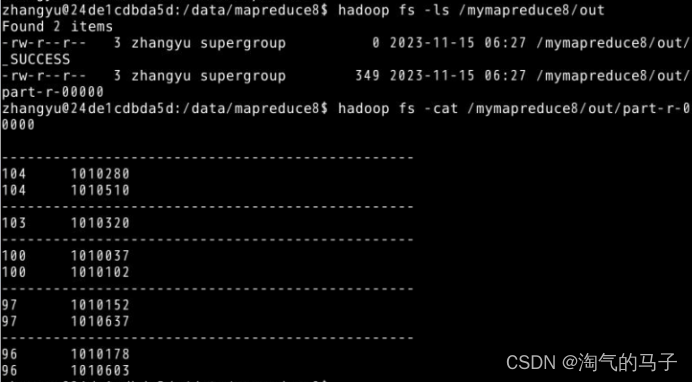
五、实验结论及心得
1理解二次排序:二次排序是MapReduce中根据多个键进行排序的方法。例如,根据日期和时间戳对日志文件进行排序。
2.掌握MapReduce模型:Map阶段处理输入数据并生成中间键值对,Reduce阶段根据键聚合值。理解这个模型对于二次排序至关重要。
3.自定义排序器:在MapReduce中,可以通过自定义排序器进行二次排序,控制键的排序方式。例如,创建复合排序器,先按日期排序,再按时间戳排序。